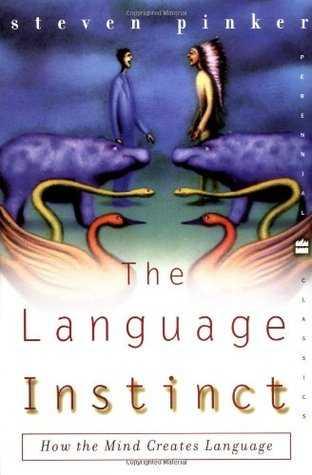Your one stop book summary, audiobook and book review spot for:
The Language Instinct Summary
About The Language Instinct Book
"A brilliant, witty, and altogether satisfying book." — New York Times Book Review
The classic work on the development of human language by the world’s leading expert on language and the mind
In The Language Instinct, the world's expert on language and mind lucidly explains everything you always wanted to know about language: how it works, how children learn it, how it changes, how the brain computes it, and how it evolved. With deft use of examples of humor and wordplay, Steven Pinker weaves our vast knowledge of language into a compelling story: language is a human instinct, wired into our brains by evolution.
The Language Instinct received the William James Book Prize from the American Psychological Association and the Public Interest Award from the Linguistics Society of America. This edition includes an update on advances in the science of language since The Language Instinct was first published.
See More
4.5/5 (2522 reviews)
Audio and text
Download free PDF
We are born with an innate capability to understand languages.
A Natural At Learning Languages
Humans have an innate language instinct, which allows them to tackle communication on a whole other level.
- Since children learn grammar without studying it, they must have an innate capability to understand it.
- There are two central principles behind all languages, which make them learnable.
- You don’t have to worry about correct grammar so much, as its rules are only one part of using language correctly.
25
Defining Language
- Language is the biological adaptation to communicate.
- There have been anthropological studies of tribes that had no contact with the larger world until the 1920s. Among those tribes, language was acquired seamlessly, without specific instruction.
- The human capacity for language is termed by the author as “Mentalese.”
- Humans acquired language through their biology. This innate possession of language a “Universal Grammar.”
- This proclamation ran counter to the social science theories of the time, which contended that language had to be deliberately taught by adults.
26
Early Instinct
Since children learn languages as early as 18 months old, but can only learn from observing adults that do it the right way, they have no way of actively telling what’s right from wrong – they’re not studying languages, they just absorb them.
Yet they still apply the right rules at the right time. For example, even deaf children apply the correct grammar, just by learning sign language from their parents.
24
A Human Instinct
The classic book on the development of human language by the world’s leading expert on language and the mind. In this classic, the world's expert on language and mind lucidly explains everything you always wanted to know about language: how it works, how children learn it, how it changes, how the brain computes it, and how it evolved. With deft use of examples of humor and wordplay, Steven Pinker weaves our vast knowledge of language into a compelling story: language is a human instinct, wired into our brains by evolution.
2
In The Descent of Man, Charles Darwin wrote, “Man has an instinctive tendency to speak, as we see in the babble of our young children; while no child has an instinctive tendency to bake, brew, or write.” The experimental psychologist, Steven Pinker, took this quote as the inspiration for his book on – what he considers – the idea that there exists an innate language instinct to be found across all cultures.
1
Elaborating on the canonical linguistic ideas of Noam Chomsky, particularly in regard to Chomsky’s Universal Grammar, Pinker presents the lay reader with numerous examples of how language acquisition, grammatical comprehension, and the tendency to speak, are all aspects of an innate linguistic tendency that human beings share, regardless of cultural background or a specific language.
1
Supercharge your mind with one idea per day
Enter your email and spend 1 minute every day to learn something new.
I agree to receive email updates
